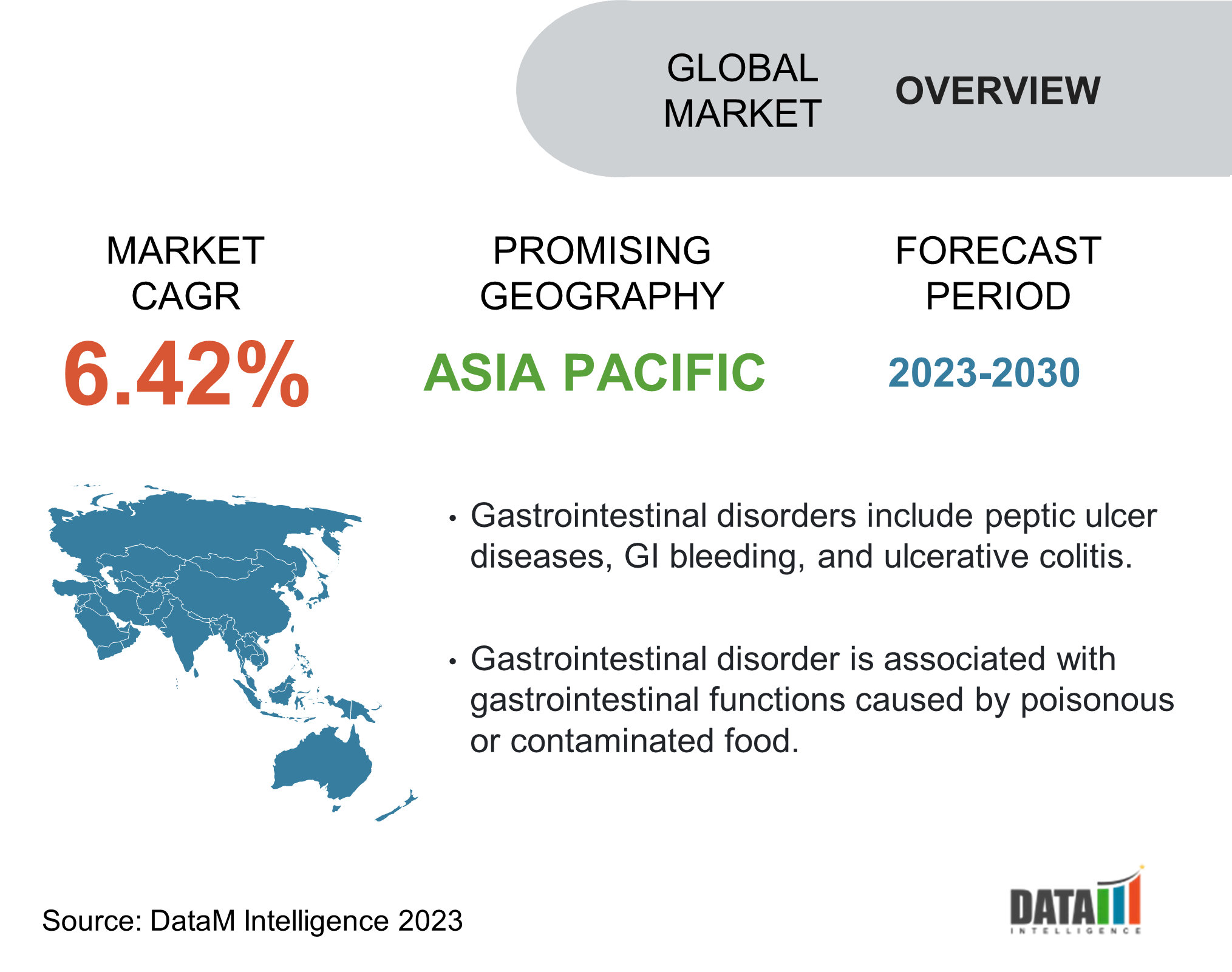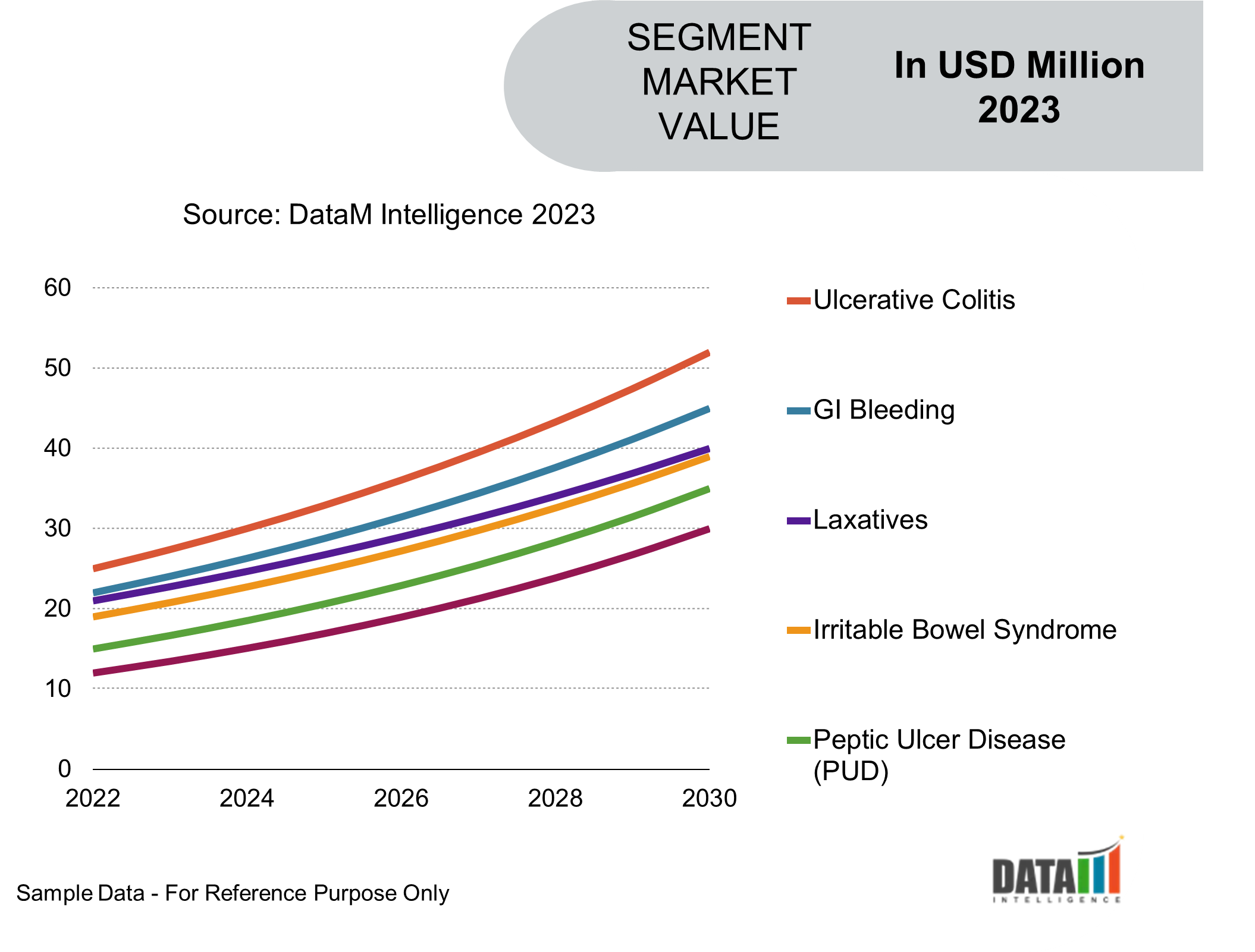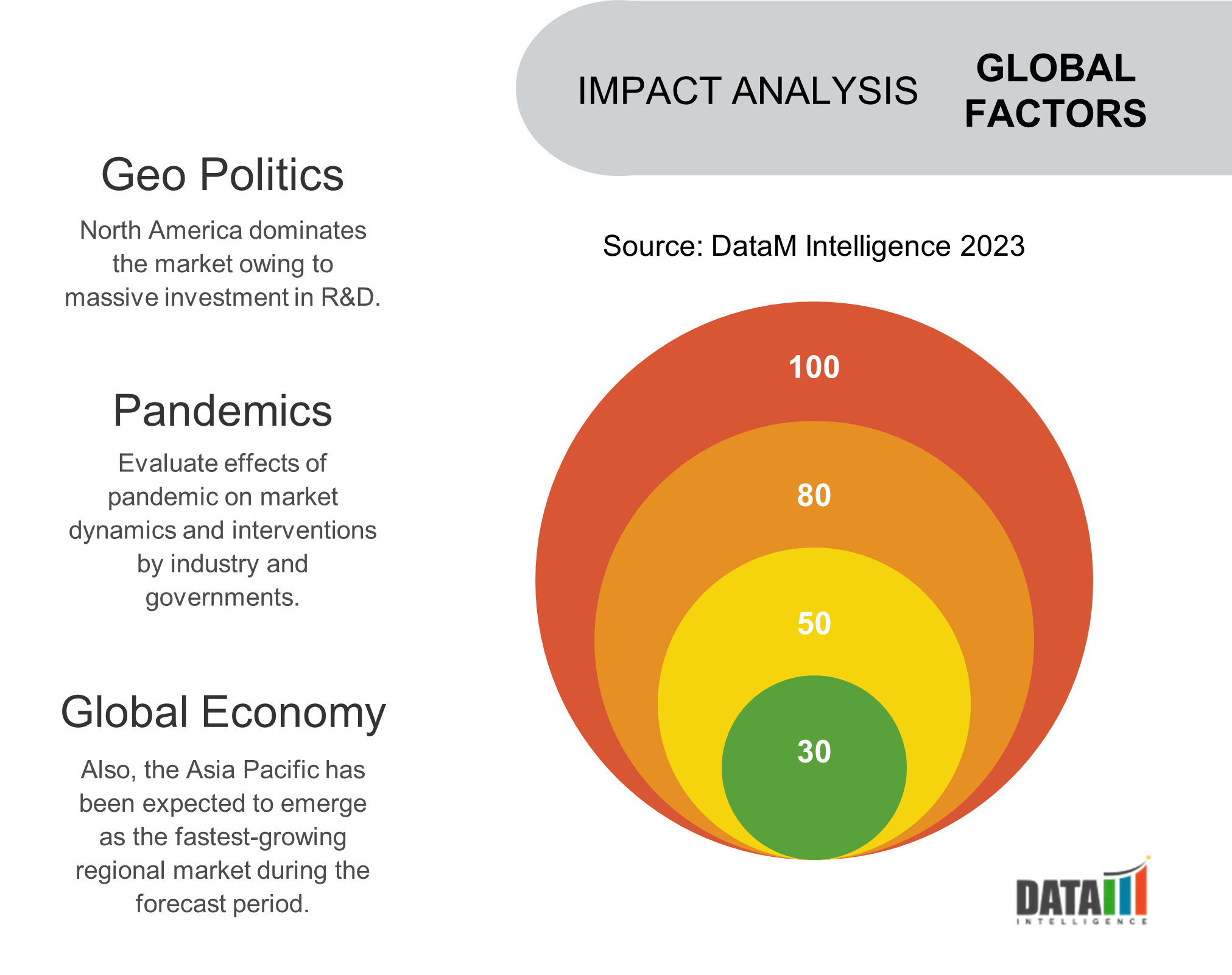Gastrointestinal Therapeutics Market is segmented By Product Category (Branded, Generic), By Route of Administration (Oral, Parenteral, Others), By Application (Ulcerative Colitis, GI Bleeding, Laxatives, Irritable Bowel Syndrome, Peptic Ulcer Disease (PUD), Others), By End User (Hospitals, Clinics, Others), By Distribution Channel (Hospital Pharmacie, Retail Pharmacies, Online Pharmacies), and By Region (North America, South America, Europe, Asia Pacific, Middle East & Africa) – Share, Size, Outlook, and Opportunity Analysis, 2024-2031.
Gastrointestinal Therapeutics Market Overview
Gastrointestinal Therapeutics Market is estimated to grow at a CAGR of 6.42% during the forecast period (2024-2031). Due to these disorders, the gastrointestinal bowel does not regulate properly. Diarrhea, gastrointestinal infections, constipation, bloating, and bleeding are common symptoms of gastrointestinal disorders. Therapeutics is available to treat all these gastrointestinal disorders, including branded and generic formulations such as Nexium, Humira, and others.

As per DataM Intelligence, Gastrointestinal Therapeutics Market study analysis offers an in-depth outlook on the market containing quantitative and qualitative data. It gives an outlook and forecast of the global market based on market segmentation. It also provides global Gastrointestinal Therapeutics Market size, and growth, along with the latest trends, opportunities, and forecast till 2030 for the global market with esteem to major countries such as the United States, Canada, Brazil, Germany, Italy, Spain, United Kingdom, Russia, European countries, United Arab Emirates, Saudi Arabia, South Africa, Japan, China, India, South Korea, Australia, and rest of the countries over the globe.
Among all regions, the North American region is expected to hold the largest share of the global market over the forecast period. Gastrointestinal Therapeutics Market in the United States and Canada produces the utmost share. Whereas the European Gastrointestinal Therapeutics Market is projected to continue its presence globally during the period of 2024-2031.
Gastrointestinal Therapeutics Market Scope
|
Metrics |
Details |
|
Market CAGR |
6.42% |
|
Segments Covered |
By Product Category, By Route of Administration, By Application, By End User, By Distribution Channel, and By Region |
|
Report Insights Covered |
Competitive Landscape Analysis, Company Profile Analysis, Market Size, Share, Growth, Demand, Recent Developments, Mergers and acquisitions, New Product Launches, Growth Strategies, Revenue Analysis, and Other key insights. |
|
Fastest Growing Region |
Asia Pacific |
|
Largest Market Share |
North America |
To Get a Free Sample Click here
Gastrointestinal Therapeutics Market Dynamics and Trends
The global gastrointestinal therapeutics market is driven by changing eating habits and styles, rising stress, an increasingly old population, a surge in the adoption of biologics for the treatment of gastrointestinal diseases, increasing prevalence of gastrointestinal diseases, and rising research activities to develop new therapy for gastrointestinal disorders.
The growing prevalence of gastointestinal diorders is expected to drive the market growth
The growing prevalence of gastrointestinal disorders is expected to drive the market throughout the forecast. As per the International Research Group reported in 2020 that 22 functional gastrointestinal disorders are caused by interactions between the gastric system and brain, such as constipation and irritable bowel syndrome (IBD). According to the Rome Foundation Global Epidemiology Study report, more than 40% of people worldwide suffer from one of the 22 gastrointestinal disorders. Also, one modeling study report from Iran estimated a 1.5-fold rise in prevalence for East Asia with 4.5 million cases of IBD, and in India, there will be 2.2 million cases of IBD in 2035. In addition, according to the United European Gastroenterology research study, the gastrointestinal disease is the reason behind the million deaths each year and disease overburden increases as the population increases. This report also mentioned that Crohn’s disease, inflammatory bowel diseases, and ulcerative colitis have risen significantly across Europe in the past years, specifically in the United Kingdom and the Scandinavian countries. Growing the number of cases of gastrointestinal disease results in increasing demand for therapies such as biologics and generics.
The complications related to blood warmer devices will hamper the growth of the market
However, short side effects related to gastrointestinal therapies, nausea, and vomiting limit the market growth. In addition, there is no permanent cure for irritable bowel syndrome and inflammatory bowel disease. This factor impacts the market. Also, the requirement of high financial costs for the health care system and morbidity faced by many countries and less awareness of specific treatment of gastrointestinal disease restraints the market worldwide.
COVID-19 Impact on Gastrointestinal Therapeutics Market
Countries worldwide face a major public health concern with the current outbreak of the coronavirus (COVID-19). GI symptoms, including diarrhea, nausea and vomiting, are frequent COVID-19 symptoms, and they affect various patients. Gastrointestinal drugs are needed in a pandemic. Therefore, gastrointestinal therapies show stable growth in the pandemic. Moreover, the new drug development and launching of products in the market boost the market growth of gastrointestinal therapeutics worldwide. For instance, in May 2020, US FDA approved Qinlock (ripretinib) tablets as a fourth-line treatment for advanced gastrointestinal stromal tumors (GIST). Quinlock is recommended for adult patients who already took the treatment of three or more kinase inhibitor therapies, including imatinib. All these factors are creating new opportunities for the gastrointestinal therapies market growth.
Gastrointestinal Therapeutics Market Segment Analysis
The ulcerative colitis segment is expected to grow at the fastest CAGR during the forecast period (2024-2031)
Ulcerative colitis is expected to drive the market over the period of forecast, owing to the increasing prevalence and research activities to develop new therapies for the market. In Japan, as per the study published in the Journal of the Anus, Rectum, and Colon in 2020, there were approximately 180,000 patients suffering ulcerative colitis. Also, the one more research study published in the Therapeutic Advances in Gastroenterology Journal in 2020, in Latin America, the prevalence and incidence of ulcerative colitis were between 0.23 to 76.1/100,000 and 0.04 to 8.00/100,000, respectively. Worldwide, the a high prevalence of ulcerative colitis in mostly Northen Europe and North America region. Its prevalence is about 156 to 291 cases per 100,000 persons per year. Compared to Chron disease, ulcerative colitis has a high prevalence in adults. The increasing population with gastrointestinal diseases leads to an increase in the demand for therapies globally. Furthermore, research and developing activities drive market growth. For instance, in 2021, according to National Clinical Trial (NCT) registry, there are approximately 244 ongoing clinical trials related to ulcerative colitis over different phases of development.

Gastrointestinal Therapeutics Market Geographical Share
North America region holds the largest market share of the global Gastrointestinal Therapeutics market
North America dominates the market for gastrointestinal therapeutics and is expected to show a similar trend over the forecast period. The North American market's growth can be attributed to the increasing prevalence of gastrointestinal disorders, changing lifestyle and eating habits, and increasing demand for various treatments for gastrointestinal disorders in the region compared to other areas. In the United States, the more common cause of gastrointestinal disease, including chronic stress due to their lifestyle, increases digestive disease. Stress affects the nervous system, which correlates with functional digestive issues like IBD. In addition, most Americans are exposed to pesticides in the food and water supply, which contributes to the gastrointestinal environment and impairs gut health. Furthermore, launching new and advanced drugs by market players coupled with increased uptake of these drugs from consumers drives the market in the region. For instance, in March 2020, USFDA approved Pizensy (lactitol) by Sebela Pharmaceuticals for treating adults' chronic idiopathic constipation (CIC).

Gastrointestinal Therapeutics Companies and Competitive Landscape
The gastrointestinal therapeutics market is a moderately competitive presence of local and global companies. Some of the key players contributing to the market's growth are Abbott, Allergan, Johnson & Johnson, Takeda, Novartis, Pfizer, Merck, F. Hoffmann-La Roche, Eli Lilly, AstraZeneca, Procter & Gamble, and Shire Pharmaceuticals among others. The major players are adopting several growth strategies such as product launches, acquisitions, and collaborations, contributing to the global growth of the Gastrointestinal Therapeutics market.
For instance,
- In January 2020, US Food and Drug Administration approved the Ayvakit (avapritinib) by Blueprint Medicines Corporation for treating unresectable or metastatic gastrointestinal stromal tumors in adults.
- In February 2021, Dr. Reddy's Laboratories introduced Lansoprazole delayed-release orally disintegrating tablets in the United States.

Abbott
Overview:
Abbott distributes and produces quality and affordable medicines of gastrointestinal for people. The company offers gastrointestinal disease therapeutics under various brands, such as Cremagel, Cremalax, Adiza, Cremadiet, Cremaffin, Eldicet, and others.
Product Portfolio:
Actnew Tablet: Actnew tablet is used for the treatment of indigestion. It helps to relieve bloating after having food, pain in the upper abdomen and early satiety (feeling full after having a little amount of food).
The global gastrointestinal therapeutics market report would provide access to approximately 80+ market data tables, 75+ figures, and in the range of 250+ (approximate) pages.

